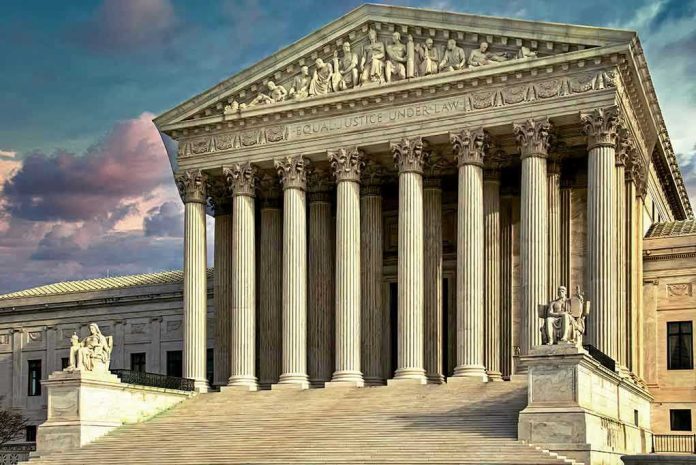
In a major win for border enforcement, the Supreme Court has cleared the way for aggressive federal immigration operations to resume in Los Angeles—igniting fierce debate over constitutional rights and federal authority.
Story Highlights
- The Supreme Court lifted restrictions, allowing federal agents to conduct “roving patrols” in Los Angeles and neighboring counties.
- This decision restores Trump-era enforcement tactics and overrules lower court efforts to block stops based on appearance, language, or occupation.
- Critics allege the ruling enables racial profiling and erodes Fourth Amendment protections, while supporters say it strengthens immigration law enforcement.
- The case underscores the ongoing national struggle between federal power and local protections for immigrant communities.
Supreme Court Restores Aggressive Immigration Enforcement
The Supreme Court, in a 6-3 decision, granted the Trump administration’s emergency appeal and lifted a lower court order that had restricted federal agents from conducting sweeping immigration patrols in Los Angeles and six surrounding counties. This move allows agents to resume stops and detentions based on factors such as appearance, spoken language, or type of employment. The Court’s conservative majority took action via the emergency docket, providing no formal explanation and swiftly overruling two lower courts that had found likely constitutional violations in these enforcement practices.
This ruling immediately empowers the Department of Homeland Security and ICE to reinstate controversial “roving patrols,” a tactic amplified during President Trump’s administration and long debated in the courts. The affected areas—spanning Los Angeles, Orange, Riverside, San Bernardino, Ventura, Santa Barbara, and San Luis Obispo counties—are home to large immigrant populations, many of whom work in low-wage sectors at high risk for enforcement actions. The Supreme Court’s decision highlights a sharp divide over how far federal authority can go in the name of border security, especially when civil liberties are at stake.
Legal Battle Over Civil Liberties and Federal Authority
The legal conflict began when lower courts issued a temporary restraining order against federal agencies, citing likely violations of the Fourth Amendment, which protects against unreasonable searches and seizures. Plaintiffs—immigrant workers and advocacy groups—argued that using race, language, and occupation as primary factors for stops amounted to unconstitutional racial profiling. The Trump administration contended that federal agents must have broad discretion to enforce immigration laws effectively, relying on the precedent of “reasonable suspicion” for stops that has existed for decades. The Supreme Court majority sided with the administration, emphasizing the need for strong enforcement tools, while dissenting justices warned of eroded constitutional protections and increased risk of discrimination.
The decision has triggered strong reactions from both sides. Supporters view the restoration of aggressive enforcement as essential for upholding the rule of law, combating illegal immigration, and protecting American jobs. Opponents, including the ACLU and other advocacy organizations, claim the ruling legitimizes racial profiling and undermines basic rights. Local businesses and immigrant families in the region now face renewed uncertainty, as federal agents resume tactics that critics say could sweep up U.S. citizens and lawful residents in the process.
Consequences for Communities and the Constitutional Debate
In the short term, the Supreme Court’s intervention allows immediate resumption of high-profile immigration sweeps, raising anxiety among immigrant communities and disrupting local economies that depend on their labor. Advocacy groups warn that the decision could set a precedent for broader use of race, language, and occupation as grounds for law enforcement stops—not only in California but nationwide. Legal experts caution that this shift risks undermining the Fourth Amendment and could fuel further litigation over the limits of federal power. A district court hearing on a preliminary injunction is scheduled for later in September, signaling that the legal battle over the constitutionality of these tactics is far from over.
Supreme Court lifts restrictions on LA immigration stops set after agents swept up US citizens https://t.co/bBNKjKdOGi
— Chicago Tribune Politics (@ChiTribCloutSt) September 8, 2025
For conservatives frustrated by years of lax enforcement and judicial roadblocks, the Supreme Court’s decision is seen as a long-overdue victory for border security and the restoration of federal authority. Yet the controversy also exposes the nation’s deep divisions over immigration, the proper scope of constitutional rights, and the balance between security and liberty. As the Trump administration moves forward with its agenda, the outcome of this case could shape immigration policy and constitutional law for years to come.
Sources:
US Supreme Court Grants Stay in LA Raids Case
Supreme Court lifts restrictions on Trump immigration tactics in California
LA immigration sweeps: Supreme Court lifts restrictions



